Norway: From 15 metres in length - far-reaching new reporting obligations
Christian Tiedt
· 30.04.2025

Be careful when planning a trip northwards: Norway has extended the reporting requirements for sailing in its own territorial waters. The inconspicuous document from the Norwegian Ministry of Defence is silent on what is behind the new rules for increased monitoring of shipping traffic.
However, it is likely that increased Russian espionage and sabotage attempts in recent months, particularly in the north of the country, have played a role in this. In any case, organising an individual cruise along the coast will be considerably more complicated.
Exceptions can be granted according to the regulation. However, the requirements for this are not specified. It is therefore not only strongly recommended that you obtain comprehensive information from the authorities before starting a trip to Norway - it is even part of the regulation (see below).
Which vehicles are affected
Any vessel longer than 15 metres or heavier than 50 tonnes, with foreign registration or a foreign skipper, must comply with the "Regulations on the entry and navigation of foreign vessels in Norwegian territorial waters" (Anløpsforskriften).
Non-compliance may result in written warnings, withdrawal of the entry permit, fines or an order to leave Norwegian territorial waters (NTW). The regulations are in Norwegian and English available. Skippers are obliged to inform themselves about the regulations before entering Norway and to comply with them.
The Inner Waters of Norway
A planned call at a Norwegian port must be made at least 24 hours before entering the Norwegian Inner Waters (NIW) within the baseline via the SafeSeaNet Norway (SSNN) must be reported. The report must include, among other things, the expected crossing point of the baseline and the name and nationality of the captain.
Every vehicle travelling within the NIW requires a point of contact (POC) in Norway. The POC can be an agent, operator, ship owner or shipping company. The POC also acts as the point of contact for the Norwegian Coastal Surveillance Centre (CSC). If no point of contact is reported, an offence has already been committed.
Further reporting obligations in Norway
In addition, there are further reporting obligations that must be fulfilled in advance by email or telephone. These include anchoring, travelling to a safe berth in emergency situations and the use of dinghies. The Norwegian Coastal Surveillance Centre (CSC) is the point of contact in each case. A Overview as PDF can be found here.
